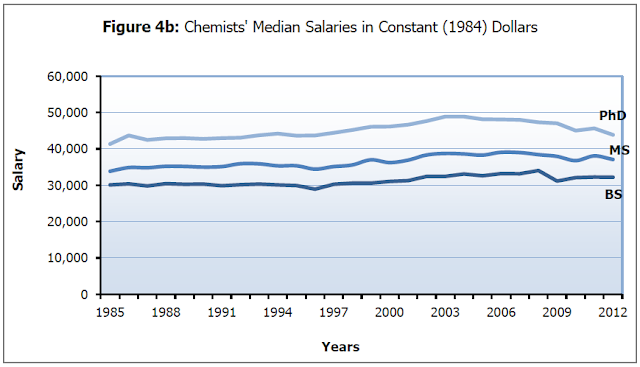From the inbox, a really interesting comment from NJ on a long career as a chemist:
I am a 50-year old industrial chemist. I am blessed with an excellent resume. I went to great schools, had pretty good grades, got a Ph.D. and have worked for desirable companies. I've been awarded patents, published papers, given presentations, etc. I'm a member of multiple professional societies. In short, I have a great resume. I also keep up on the literature. I'm a new employee’s worse nightmare: I know everything they do and more. Plus I have experience. Interviewers, recruiters and HR people all have told me that I have a great resume. While that is important, I've had a trump card in my pocket for getting a job. I kill at interviews. Whenever I’ve gotten an onsite interview, I always received the offer. Always.
Then something happened recently that changed this. It started innocently enough when after an onsite interview, I didn't get the offer. OK., all streaks must end. I really wasn't concerned until it happened a second time, and then a third time. It's happened so many times now that I have to stop and think about what the exact number is.
I'm sure CJ has younger readers who think that at 50, I am getting ready to retire. No. I'm old enough that I can't collect full social security until I am 67. That means that I am working for at least 17 more years. 17 years! Think about it. I've only worked for 23 years. I'm barely halfway done with my career. Retirement is not in the picture at all. I also doubt that any employer looking at hiring a younger person expects them to stick around 17 years.
I started becoming concerned with the difficulty of find my next job, but another thought has arisen that has totally scared the living-daylights out of me: I now realize that there are very few moves left on the chessboard for me.
If you're not familiar with the game of Chess, let me explain. People who study the game generally break it into three different phases. First there is the opening. This is usually the first dozen or so moves that each side makes. It is usually as tightly choreographed as a Broadway musical number. White does this, then black does this. There is very little thought involved since the opening are usually memorized from books. Next comes the middle game. This is the exciting part plans are laid and put into action, traps are set and most of the pieces are captured. Books can provide guidance, but the options are many and it is often difficult to see what the correct move is except with hindsight.
Finally there is the endgame. This is when there are few pieces left on the board. It is impossible to predict at the opening of the game what pieces will be left in the endgame and where they will be, but that doesn’t prevent people from putting intense effort into studying endgames. What’s ironic is that the endgame is usually just as tightly limited in choices as the opening is even as it appears otherwise. The board is wide open so that a lot of moves CAN be made, but most of them are bad moves. There are very few correct moves in any given situation. Very good chess players will never finish a game entirely. Once the endgame is presented, it is pretty academic as to how it will turn out. The players acknowledge this outcome and end the game.
I now see that my career has been like a chess game.
In the beginning, I did what everyone else did. I applied for jobs in my field, hoping to get an entry level position. Every newly degreed person does the same thing using more or less the same procedures. This was the opening. Then I got to the middle of my career where after having gained some experience, I started to move around through promotions, lateral transfers within a company and leaving for another company entirely. There were lots of options to consider. While the moves I made usually seemed like good ones at the time, it is only with hindsight that I can see which ones were truly good and which ones were awful.
And now I am at the endgame. I am sure that I will eventually find another job, but I can see already that that's going to be it. Wherever I end up will most likely be my last job. The next employer will keep me until I retire or am laid off. That's what scares me. Not only do I now have to hope to get an offer, but I have to decide if that employer and I are going to want each other for another 17 years. Because if it doesn’t work out, if I get laid off before my 17 years is up, I may never be able to recover, and that’s what really scares me.
My search goes on, but it is a far more serious venture than ever before. These additional worries are now hanging over me, and they will never go away.
So this is my situation. I’ve always heard that finding a job is more difficult for older workers and I find that to be true, but I’ve never really heard others describe this phase of my life, at this young age of 50, as the endgame: that there are few moves left, that every move now is critical, and how scary the recognition of that is.
Thanks to NJ for an excellent essay.






